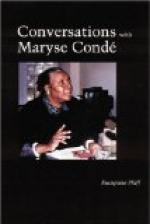|
This section contains 554 words (approx. 2 pages at 300 words per page) |

|
SOURCE: A review of Moi, Tituba, sorcière noire de Salem, in World Literature Today, Vol. 61, No. 2, Spring, 1987, pp. 337-38.
In the following review, Bruner discusses Condé's depiction of power in Moi, Tituba, sorcière noire de Salem.
All of Maryse Condé's major fiction is rooted in a study of power. Her protagonists—fictional, legendary, or historical—appear to emerge almost haphazardly as heroes, martyrs, saints, or sacrificial victims. In tracing their lives, Condé shows the formative influence of their fervors upon a mass of characters. Somehow some very human individuals seem singled out for eminence or persecution. In her two-volume epic Ségou, for example, she portrays three generations of a Bambara royal dynasty at the time the march of Islam pushed aside the traditional animist empire of Ségou. The many family members in the novels undergo psychological, cultural, and geographic uprooting as they...
|
This section contains 554 words (approx. 2 pages at 300 words per page) |

|


